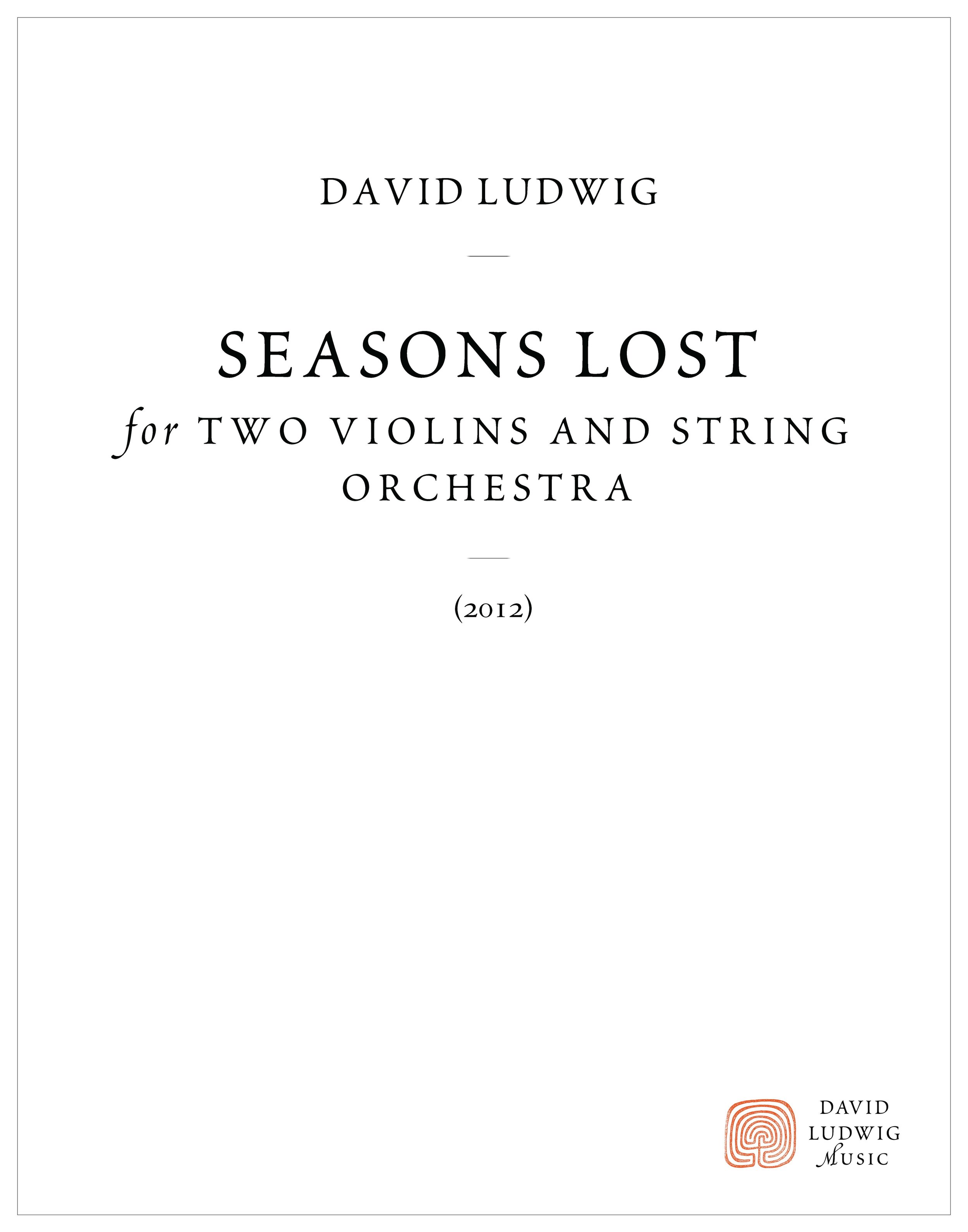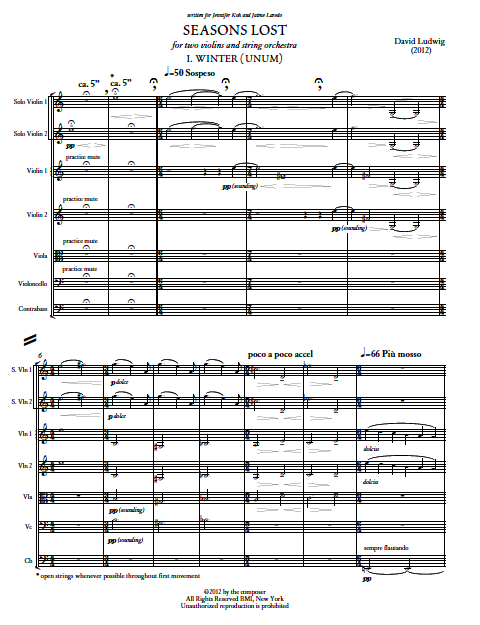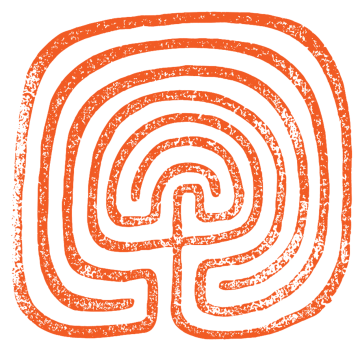

Seasons Lost
Seasons Lost (2011) for two solo violins and string orchestra - 18'
-2 solo vln + string orchestra
-commissioned for Jennifer Koh and Jaime Laredo
-Premiered May 2012
Rental information
Program Listing
Seasons Lost (2011)
I. Winter (unum)
II. Spring (duo)
III. Summer (tertius)
IV. Fall (quartus)
“...a sort of global-warming-era take on Vivaldi’s iconic masterpiece, a wistful look at how the seasons are slowly losing their identity. Ludwig has no shortage of interesting ideas — and a fine talent for evoking a sense of memory and mystery — and “Seasons” provided a worthwhile listen.”
—Washington Post
Program Notes
Seasons Lost is the story of the time before our winters and summers ran together; the time before warm rain where there should be snow, and deadly storms where there should be cool autumn days. I remember from my childhood growing up on the east coast the four seasons that were once distinct, but that are now lost. The reality of global climate change is important for me to respond to, and so I wrote Seasons Lost to add my voice to the discussion.
With each season comes its number, and that numerology is found in the instrumentation and colors of the four movements of the piece. The music begins in winter, in distant unisons of cold days where the light is icy blue and the air stings when it hits bare skin. The second movement is a duet between violin soloists; an intertwining of themes and melodies like the growing greenery of spring. The third movement evokes a hot summer in trios of solo players set on a backdrop of hazy, smoky nights and smoldering bonfires. Quartets play in the last movement of fall to create the sonic image of howling winds in autumn that rustle the trees and shake their leaves to the ground. Numbers weave through the fabric of the music, as well, from the gradual unraveling of melodies to the building blocks of the harmonies throughout.
Seasons Lost was commissioned by a consortium of the Delaware Symphony, the Vermont Symphony, and The Curtis Institute of Music after a project envisioned by soloists Jennifer Koh and Jaime Laredo, with generous additional support from Augusta Gross and Leslie Samuels.
Press
“The revelation on Sunday’s program was David Ludwig’s brilliant “Season’s Lost.” The four movements reflect the seasons but also reflect the damage of global warming.
The opening “Winter” delivers the starkness of the season, with the solo violins weaving intimately and lyrically over the ethereal background of the strings. With “Spring” comes brilliance, accelerating in anticipation.
'Summer’ is engulfed in heat, sometimes sultry, sometimes uncomfortable and stormy. ‘Fall’ begins with a frenzy that is occasionally interrupted by moments of lyricism before dashing rapidly to the finale.
‘Seasons Lost’ is a dramatic journey — sometimes pastoral, sometimes stormy — effectively employing both tonal and atonal musical language in telling its story. With only strings, Ludwig manages to color the story effectively and beautifully. The overall effect was fascinating and emotionally powerful.” —Rutland Herald
“Curtis faculty composer David Ludwig unveiled his Seasons Lost, conceived as a counterpart to Vivaldi’s Four Seasons, but turned elegiac amid current climate changes. It’s full of beautiful ideas contrasting with playful/menacing Vivaldian gestures, progressing from winter to fall with music that grows richer and more intricate.” —Philadelphia Inquirer
“The third ‘double’ concerto of the evening was David Ludwig’s ‘Season’s Lost’ (2012), a set of four movements: Winter, Spring, Summer, and Fall. The evocative work received a well-deserved enthusiastic response.” —Local Arts Live
‘Winter (unum)’ is bleak and sparse, with some haunting dissonance to enhance the eerie mood, the soloists’ lack of vibrato apt. ‘Spring (duo)’ proved a hopeful dialog, culminating in the excitement of tremolo bowing while ‘Summer (tertius)’ was surprisingly dark and wistful, a minor-key tonality alluded to but not embraced, the orchestra becoming an entity in itself, adding to the intensity. ‘Fall (quartus)’ begins as a virtuosic display for the violinists, with an alternating slower section that is romantic in its unabashed passion. —Classicalsource.com
[Summer] was captivating. It felt very personal—Ludwig plays with ensembles of various sizes throughout the piece, but the technique was most effective here. A series of trios involving the two soloists and section principals made it feel like a chamber piece. This “Summer” was not a lazy but a melancholy one—the “loss” of the title came through here in a feeling of rueful nostalgia. There was overpowering lethargy, exhaustion; near the end of the movement, there was a huge swell in the sound, growing almost oppressive, but relief came as the heat subsided, cooled off by the violinists’ E strings. The entrance of “Autumn” was jarring—blustering, I suppose. It was more confused than any of the other movements, perhaps by design. Stretches reminiscent of the brooding “Summer” were violently interrupted by turbulent gusts. —New Criterion
“One of them, David Ludwig's "Seasons Lost," is quite a find, and it might be put together with Vivaldi's "Four Seasons" and/or Piazzolla's "Cuatro Estaciones Porteños" on a program. Ludwig deftly weaves together programmatic evocations of the season, a numerical sequence of concertino groups running from one to four members, and an extramusical consideration: Ludwig mourns the diminishing regularity of the seasons that has occurred with climate change…. [Two x Four is] A personal and generally enjoyable document, with one piece that could become a repertory work.” - All Music Guide (Barnes and Noble)
“Ludwig’s Lost Seasons is a meditation on how he remembers the distinct seasons of his Bucks County childhood and how those natural seasons are now blurry and less defined. Yearning and quixotic string lines create the introspection of “Winter” (unum). It gives way to “Spring” (duo) with violin dialogue, driving orchestral crashing and astringent tones which gives it a sense of inescapable torpor. A parallel drama winds down, and the resolves of “Summer” (tertius), the longest movement, is framed with dark, lurching effects, but it never overtakes the delicate voices of the violins. “Fall” (quartus) just thunders in, violin trills blazing, tempered with discordant tones. There are pastorals and vistas summoned throughout, and Ludwig’s structures are very assessable, full of orchestral colors, allowing for interpretive accents. Koh and Laredo lead through beautiful and harrowing sound fields that inevitably wend toward jarring resolves.
Ludwig is everywhere these days. He was one of three composers who were commissioned by the Philadelphia Orchestra for which he composed a bassoon concerto for David Makasawa, and it received great reviews. He also composed his first film score.” – ConcertoNet.com
“Two x Four concludes with Ludwig’s Seasons Lost. The composer claims that the piece “is the story of the time before our winters and summers ran together; the time before warm rain where there should be snow, and deadly storms where there should be cool autumn days.” The suite of four seasonal pieces begins with the mystery of “Winter”. It is a movement in which the musical potential of teacher and pupil is not fully realized. The familiar musical trope of ascending minor 2nds questions the competence of the relationship between Laredo and Koh, as the two soloists are lost in confusion and doubt. Moments of accord sound distant, instrumental unisons which cannot be reached. At the conclusion, the violinists rise from winter’s morning dew in ascending 5ths, promising hope, and leading to the second movement, “Spring”. In this section, Laredo and Koh discover what remained elusive in “Winter”: a lush medley of themes. In many ways, the relationship between the soloists is similar to that in Bach’s Concerto. Between the two there is a conversational call-and-response. “Summer” wanders through warm July nights. The daring glissandos add an air of hazy confusion, throwing all possibilities in the air. Indeed, Summer is a time of opportunity, exploration, when one can wander aimlessly, in search of something—or some melody—which has yet to be traveled. Just as “Summer” ends, “Fall” begins. Laredo and Koh prepare their accompanying quartet with rapid, violent tremolos which are answered by thunderous crescendos of tremolos in the lower registers of the ensemble. The power of “Fall” evokes that of the delicate balance between two soloists, a sort of comic warning: though together they might achieve opulent beauty, they too are capable of thunderous destruction, literal forces of nature” – I Care if You Listen: A Digital Magazine + A Blog About New Classical Music, Art, and Technology
“David Ludwig's Seasons Lost is an artist's response to the reality of global climate change.
The final work on the program is Seasons Lost for two violins and string orchestra by American classical composer David Ludwig (1974). Ludwig descends from a roster of famous musicians, including his uncle, pianist Peter Serkin, his grandfather, pianist Rudolf Serkin, and his great-grandfather, violinist Adolf Busch. Yes, he also knows his business; he was born to it. Ludwig notes that the music represents a time before global warming caused the seasons to run together, a time when Winter, Spring, Summer, and Fall, the four movements in his tone poem, had distinct divisional (and tonal) qualities. The piece works as a modern take on Vivaldi's famous music, but does so more sweetly and with a more-subtle shading of colorations. Koh and Laredo do a splendid job pointing up the differing harmonic changes in the piece and emphasizing the composer's poetic musical vision.” – Classical Candor: Classical Music Reviews by John J. Puccio
“David Ludwig’s 2012 Seasons Lost is a substantial (16-minute) piece that is much more than the individual components of its form and structure–the scoring for two violins and string orchestra is less about the two violins than the larger, very profound confluence of forces, which make quite a powerful statement, as dynamic as anything that might be realized by a larger, more diverse ensemble. Its four movements are smart and inventive. The longest, “Summer (tertius)”, has a theme reminiscent of a famous Chopin prelude; the final one, “Fall (quartus)”, is a vibrant, fiery, gritty, string-minded tour de force, a flight of the bumblebee infused with a ferocious madness and menace, mellowed with a bit of intoxicated levity, then returning to a concluding wild rush to oblivion.” – Classicstoday.com
“[Season’s Lost is] vivid and pictorial and I was glad to meet Ludwig's music” – Moderntempo.net
“The second commissioned work, Curtis-based composer David Ludwig’s Seasons Lost, tells the story “of the time before our winters and summers ran together,” a nostalgic remembrance of the world before climate change set in. The four-movement concerto, commissioned by a consortium of the Delaware and Vermont Symphonies and the Curtis Institute of Music, is an obvious reference to Vivaldi’s famous quartet of concertos.
Ludwig begins with Winter (subtitled Unum), a bleak movement which quotes thematic snippets from Vivaldi and whose descending lines end in a miasma. (Laredo plays first in all movements.) Spring, after a scratchy opening gesture, is sweetly vivacious, with strong rhythms and accents. A languid, nostalgic Summer (Tertius) creeps upward musically with swoops from trios of solo players, leaving the first violinist on a high note.
After a virtuosic dialogue between the two soloists, Fall (Quartus) groups players in quartets to simulate howling winds. A slower, undulating section leads to autumnal, descending lines, a recapitulation and a highly rhythmical section with slap pizzicatos” – ClevelandClassical.com
“A composer based at the Curtis Institute, David Ludwig (b. 1974) wrote his evocative Seasons Lost (2012) as a contemporary counterpart to Vivaldi’s Four Seasons, informed by his dire concerns about climate change. Mr. Ludwig’s four-movement, double-violin concerto is “full of beautiful ideas contrasting with playful/menacing Vivaldian gestures” (Philadelphia Inquirer). Ludwig’s progression moves from Winter through Fall, using at first open, modal chords, augmented scales, and pedal points. “Spring” evolves as a duet for the two principals, assisted by the string ensemble. Scales and repeated riffs in high registers dominate. The longest, “sultriest” movement, “Summer,” utilizes portamento and slides set in trio form to suggest “hazy, smoky nights and smoldering bonfires.” Whether the last pages represent some apocalyptic fire and its aftermath or not, the final bars proffer weepy consolation or melted objects from a Dali painting. “Fall” begins abuzz with “howling winds in autumn” set in quartet form. While some relief follows, it does so grudgingly, only to yield to the chilling effects of a ravaged balance of Nature. Sterling sonics from Engineer George Blood keep our ears pounding.” – 5/26/14 – Audiophile Audition
“David Ludwig's "Seasons Lost" (the other 2-year-old work) has a political-environmental point to make in evoking the traditional distinctness of each season in the northern temperate climate — before climate change knocked such characteristics askew.
He's assigned a number to each season, reflecting the governing texture of each movement— from the severity of Winter's unisons through a bluster of quartet writing in the finale, Fall. The coming bleakness is suggested there, providing a cyclical sense of closure with an abrupt but consonant ending. Earlier, the way the music breaks out in a kind of climatic violence seems earned and unforced. The two middle movements — Spring, whose intertwining duo evokes the Bach Double; and Summer, with its trios rising and falling past each other against a lush, heavy ensemble center — are likewise well-crafted and freshly pictorial.” – Jay Harvey Upstage
“The other two works, both Koh commissions premiered in 2012, have edgier intentions but are never off-putting… David Ludwig’s four-movement “Seasons Lost” attempts to address climate change by conjuring vivid seasonal differences. The carefree flirtation of “Spring” and the blustery buzzing of “Fall” are the most arresting, especially with Laredo and Koh’s intense playing, beautifully reproduced by Cedille Record’s engineers.” – Newsobserver.com
“Seasons Lost’ von David Ludwig (*1974), ein sehr stimmungsvolles Stück, in dem die Charaktere der einzelnen Jahreszeiten sehr gut nachzuvollziehen sind” (Translation as best as I could – David Ludwig’s Season’s Lost is a very atmospheric piece, in which the separate characters of the seasons are very well understood) – Pizzicato: Remy Franck’s Journal about Classical Music
